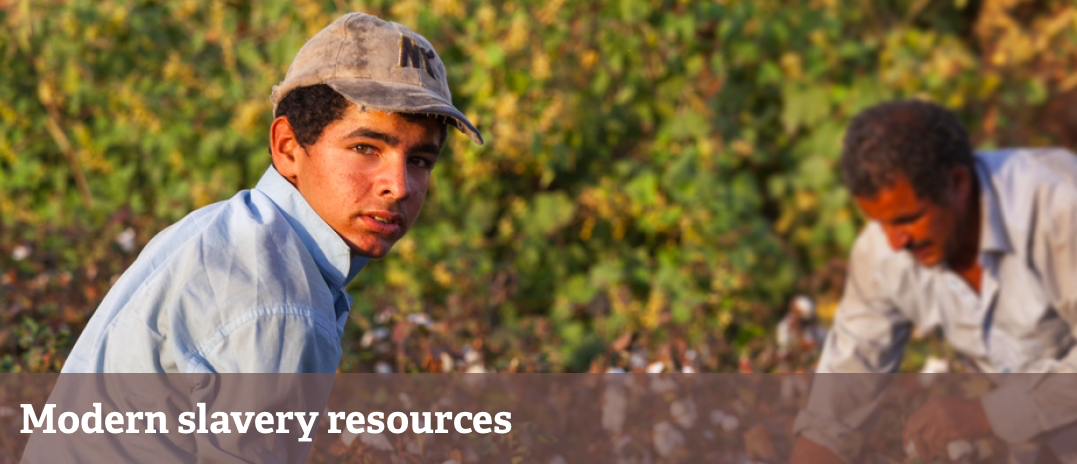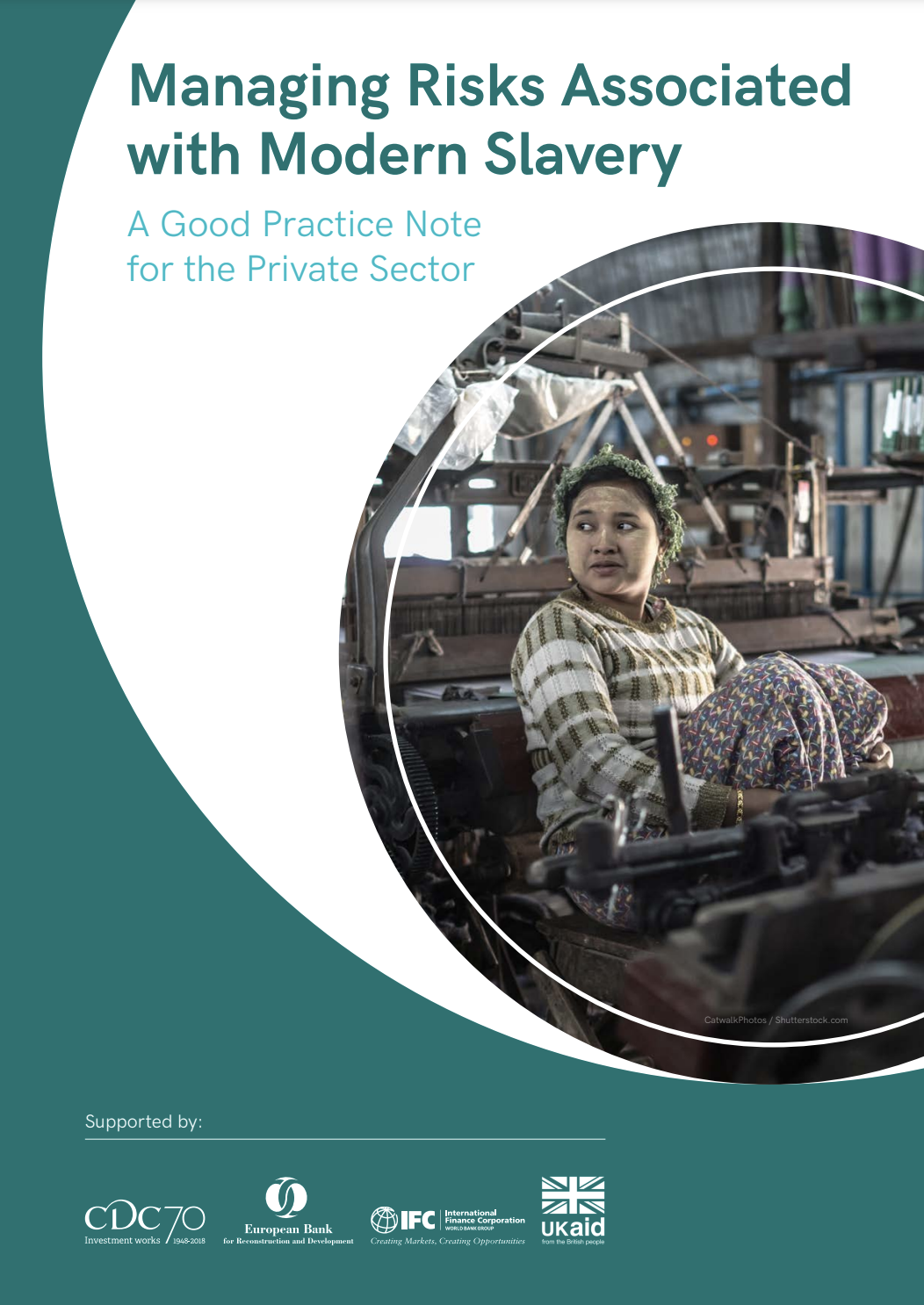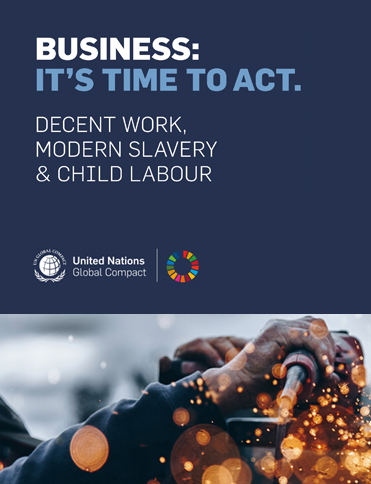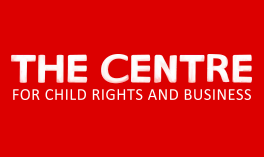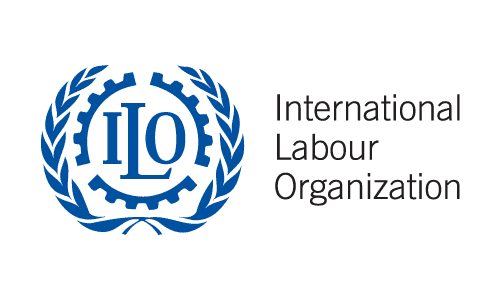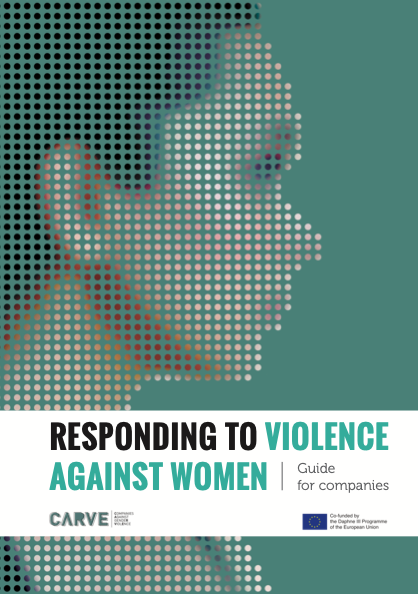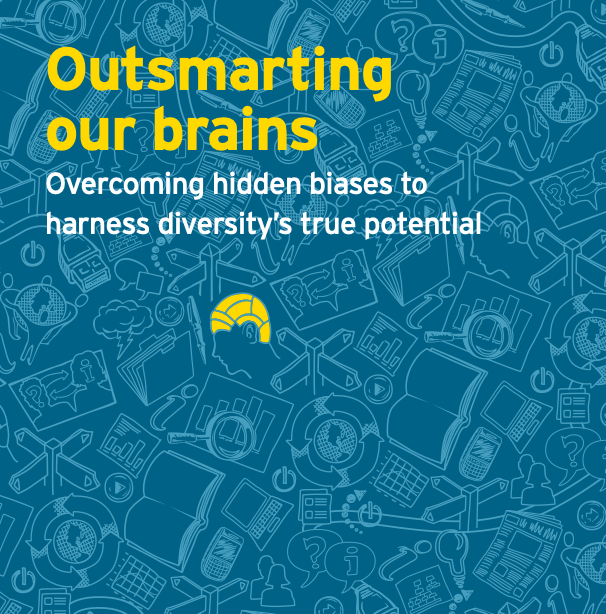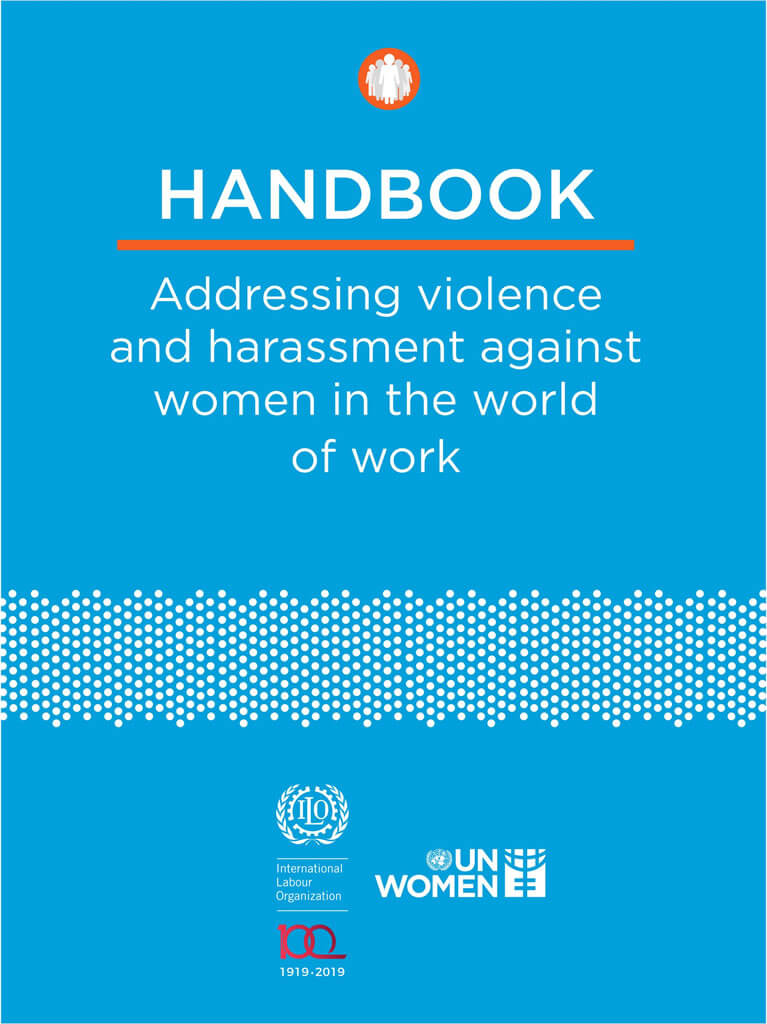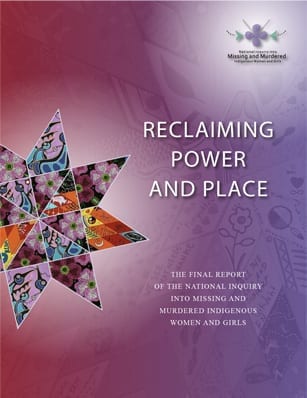Human Dignity and Integrity
Description
Includes freedom from torture, cruel, inhuman, or degrading treatment, or punishment; freedom from violence or exploitation; freedom from child labour, forced or compulsory labour, debt bondage, prison labour, or other forms of modern slavery; human trafficking; and deceitful recruitment.
Share this Subissue on:LinkedIn
Resources
Getting Started Guide
Human Dignity and Integrity (Tackling Modern Slavery): A Getting Started Guide
Human rights ensure that everyone can live a life of dignity and respect, without discrimination or deprivation. Anchored in research, our Human Dignity and Integrity (Tackling Modern Slavery): A Getting Started Guide aims to support your company as it begins or revisits a human rights strategy. It helps build a foundational understanding of the issue and provides clarity on the work ahead.
Modern Slavery and Forced Labour
Modern Slavery Act Resources
The Ethical Trading Initiative has compiled various resources to help you understand how your organisation can contribute to the abolition of modern slavery. The website is arranged into six sub-categories including ETI resources such as blogs and training courses; advocacy pieces such as submissions to the Australian and Canadian Governments; guidance and examples, such as a list of published company statements; existing projects, such as the DOL's Child Labor and Forced Labor Program; background research and reports from the ILO, UN, and more; and reports and case studies from a wide range of industries.
Modern Slavery Business & Investor Toolkit
Walk Free is an international human rights group focused on the eradication of modern slavery, and they have created this comprehensive toolkit to help companies support this mission. It includes a modern slavery self-assessment for measuring and benchmarking your organisation's current performance, as well as business guides, videos, learning modules, and research to help you understand and address the problem of modern slavery. It also features case studies, codes of conduct, company policies, and legal frameworks for advancing due diligence, taking corrective action, and providing remedy. This holistic toolkit is an excellent starting point for both junior and senior sustainability and procurement professionals.
Tackling Modern Slavery in Supply Chains
Slavery exists in all stages of procurement, and as supply chains grow and become more complex, it becomes increasingly challenging to ensure freedom, fairness, and safety in the workplace. This resource will help those who want concrete guidance on how to reduce or eliminate the risk of modern slavery occurring in their supply chains. This guide explores effective standards, risk assessments, audits, corrective measures, and practical advice for engaging with suppliers, as well as a comprehensive collection of relevant tools.
Base Code Guidance: Modern Slavery
This guide from the Ethical Trading Initiative (ETI) can help you better understand modern slavery, why businesses have a responsibility to address it, and how they can take meaningful action to end it. It explains the root causes of modern slavery and outlines four steps for applying the ETI Base Code on modern slavery. These include assessing the risk of modern slavery; identifying actions and leverage points; mitigating risk of modern slavery and remediating harms; and monitoring, reviewing, reporting. This practical guide will be most useful to supply chain management and sustainability teams.
ILO indicators of forced labour
This resource from the ILO features practical tools that can help you to detect forced labour. The guide highlights the most common indicators of forced labour, including outlining the most frequent signs of coercion and lack of consent, and explains how to interpret them in real-world contexts. This concise guide can also support referral and formal identification processes, prosecution, and data collection. This resource will be especially beneficial to labour inspectors, change agents, and others who may encounter victims of forced labour.
Social Auditing and Ethical Certification
This brief by Re:Structure Lab proposes a set of reforms to address key supply chain auditing challenges. These include increasing NGO, union, and worker-led involvement, as well as addressing financial conflicts of interest between auditors and business.
Advancing modern slavery reporting to meet stakeholder expectations
This toolkit was created by GRI and the Responsible Labor Initiative (RLI) to encourage and improve reporting on modern slavery and to support action across the value chain. This toolkit will help change agents to understand why modern slavery has become increasingly important to corporate sustainability reporting, and includes a practical approach for them to report on the issue in alignment with stakeholder expectations. Included are summaries of key slavery-related topics, questions, and concerns; reporting examples; testimonials from reporters and stakeholders; relevant GRI standards guidance; and examples of tools that will facilitate your reporting.
Good Practice Note: Managing Risks Associated with Modern Slavery
This comprehensive good practice note from the Ethical Trading Initiative (ETI) and Ergon Associates can help you better understand modern slavery and how to address it within your business. It provides a background on modern slavery, including root causes and its importance to business. It also shares practical information on relevant standards; how to support internal policy development; how to mitigate risks and handle remediation; and how to conduct monitoring and reporting. It also provides a series of tools, including questionnaires, checklists, and resource lists. This guide will be most useful to supply chain management and sustainability teams.
Business: It's Time to Act - Decent Work, Modern Slavery, and Child Labour
Modern slavery is a human rights violation that is alarmingly widespread. This concise guide from UN Global Compact can help you understand the complexities of modern slavery and the role of business in tackling this pervasive issue. The guide provides an overview of five key steps businesses can take to address modern slavery, as well as three steps specifically focused on ending child labour. It concludes with a list of resources to help get you started, as well as a list of key definitions. The guide will be most useful to supply chain managers, sustainability practitioners, and human rights specialists.
Global Estimates of Modern Slavery: Forced Labour and Forced Marriage
This comprehensive report can help you to better understand the extent of modern slavery within the global economy, as well as trends related to forced labour and forced marriage. It also provides an overview of key actions required to protect citizens and workers.
Combating Forced Labour: A Handbook For Employers and Business
This handbook produced by the International Labour Organisation and the International Organisation of Employers will help you address the risk of forced labour and human trafficking in your operations and supply chain. It consists of a series of seven booklets, offering practical guidance to prevent and remediate these issues. It includes an FAQ reference guide for employers; a set of guiding principles; a compliance assessment checklist; concrete tips for taking action; and a set of case studies. These booklets will be most useful to Sustainability, Human Resource, and Procurement and Supply Chain teams, and may be especially relevant to social auditing practitioners.
Child Labour Guidance Tool for Business
The International Labour Organisation and the International Organisation of Employers created this resource to help you understand and address the risk of child labour in your operations and supply chain. It introduces the issue and explains how it may be relevant to your company; explains how to meet the UNDP’s due diligence requirements; and outlines practical steps companies can take in relation to developing policy, taking action, and communicating performance. This guidance is intended for Sustainability, Human Resource, and Procurement and Supply Chain professionals, and especially those working in the extractive and agricultural sectors.
Corporations are paying for worker abuse audits that are ‘designed to fail’, say insiders
This article from the Guardian can help you understand why social audits tend to be unreliable and ineffective. Based on interviews with professional auditors, it explains how labour abuse along the supply chain can go unreported and unaddressed due to the limited power auditors have and the pressure they face to downplay infractions. It also highlights the broader challenges of the social auditing industry. These firsthand insights will be especially useful to supply chain and sustainability practitioners.
Governing Forced Labour in Chains
This platform can help you understand why modern slavery in global supply chains persists despite continued efforts to eliminate it. The platform features an informative blog exploring the issue, as well as various research outputs, including reports, briefs, and presentations produced by GFLC. This platform will be most useful to supply chain and sustainability practitioners, and especially those in Canada; some resources specifically focus on the Canadian legal context.
Profits and poverty: The economics of forced labour
US$236 billion in annual profit is generated from forced labour, globally. This study from the ILO can help you understand the source and scale of these illegal profits at global, regional, and sectoral levels. The first section provides background information on forced labour, including illegal profit estimates; section two describes the methodology employed to estimate illegal profits; section three presents the estimation results; and section four takes a closer look at profits arising from the unlawful recruitment fees. These insights will be most useful to sustainability, supply chain, and risk management professionals
Tackling Child Labor: A Guide for Financial Institutions
This joint publication by Shift, The Centre for Child Rights and Business (The Centre), and UNICEF captures some of the key take-aways from a peer-learning session of Shift's Financial Institutions Practitioners Circle (‘FIs Circle’) on the topic of child labour. Drawing on the experience of the three organisations working with real-economy companies and financial institutions, this resource highlights ways for banks to more strategically evaluate and improve portfolio company capacity to address child labour. It explains salient child rights risks for banks and financial institutions and explores three ways in which they can strengthen current approaches to addressing child labour risk in line with the UN Guiding Principles for Business and Human Rights: improving screening for indicators of child labour risk, improving engagement with portfolio companies on action on child labour, and participating in multi-stakeholder initiatives that include action on child labour.
Climate Change & Modern Slavery Hub
This map-based database can help you understand how climate change and climate migration enable different types of human exploitation that fall under the umbrella of “modern slavery." The resource brings together many existing reports, addressing factors that increase vulnerability to modern slavery in the context of climate change. It allows you to explore these reports regionally through an interactive map as well as through six filter options, including “type of modern slavery," “type of migration," and “type of climatic event." This resource can be used to support supply chain risk identification, which will be most useful to supply chain and sustainability practitioners whose organisations' have global sourcing footprints.
The Due Diligence Toolkit for Fair Recruitment
This fair recruitment toolkit from the Global Business Network on Forced Labour can help you to set out a due diligence process when hiring workers from abroad. Designed with SMEs in mind, the toolkit is divided into five sections with step-by-step guidance that can help you to build a framework for fair recruitment; understand recruitment needs and risks; work with agents and other third parties to mitigate risks; track progress; and deal with problems and grievances effectively. This toolkit will be especially beneficial to hiring managers and other recruitment and HR professionals.
The Dindigul Agreement
This resource from Re:Structure Lab can help you to understand Worker-Driven Social Responsibility (WSR) agreements - a key tool for combatting forced labor, gender-based violence and harassment, and overlapping human rights and labor abuses in supply chains. The brief highlights the key elements of WSR agreements to ensure they can be supported – and not undermined – by regulatory approaches, and uses the 2022 Dindigul Agreement as one such example. The Dindigul Agreement was pioneered by an independent majority Dalit trade union in India run by women and comprises a set of legally binding agreements with major apparel companies. This resource will be especially beneficial to procurement professionals, sustainability professionals, and others parties responsible for raising labour standards in supply chains.
Rights Lab
The University of Nottingham's Rights Lab is the largest group of modern slavery researchers, and home to many leading modern slavery experts. The Rights Lab has four research programmes: Measurement and Geographies; Health and Communities; Law and Policy; and Business and Economies. Through these programmes, the Rights Lab delivers new and cutting-edge research that provides rigorous data, evidence, and discoveries for global anti-slavery efforts. The Rights Lab produce academic publications, reports, and briefings on a broad range of relevant topics, such as modern slavery prevalence estimations, the impact of immigration policies on human trafficking, regulation and governance gaps in the detection of labour exploitation, methods for preventing exploitation, and more. They produce video case studies, podcasts, toolkits, maps, and more, and also provide services for developing strategic responses to modern slavery risk, deep analysis and risk assessments, and best practice recommendations.
Due Diligence Principles for Child Labour Remediation
This straight-forward two-pager outlines eleven essential principles that can help your company to promote effective child labour due diligence. Towards achieving this end, the principles address four key topics: the rights of the child, the responsibilities of companies, key elements of child labour remediation management, and links to government structures.
Equity, Diversity, Inclusion, and Safety
Dhaka Principles on Migration with Dignity
Companies around the world depend on migrant labour, and yet these workers are frequently exploited. To ensure they are respected through every step of the recruitment and employment process, the IHRB developed the Dhaka Principles - a set of human rights-based principles to ensure and enhance the rights of these individuals. If you are looking to create a more fair, just, and equitable environment for migrant workers, these ten principles provide a strong starting foundation.
Ending Violence and Harassment in the World of Work
ILO Convention No. 190 (C190) is the first international treaty to recognise the right of everyone to a world of work free from violence and harassment, including gender-based violence and harassment. Although it is intended for national governments to implement, its adoption has implications for business sustainability. The core principles and accompanying video series will be particularly useful for sustainability, legal, and compliance professionals tasked with preventing and addressing violence and harassment in the workplace.
Responding to Violence Against Women: Guide for Companies
CARVE has created this guide to shed light on ways for companies to address violence within the workplace. It includes business practices, recommendations, and policies for preventing and responding to violence against women. This resource will help business managers in particular to identify cases of violence, interact openly and empathetically with those who are suffering, and raise awareness on the subject.
Outsmarting our brains: Overcoming hidden biases to harness diversity’s true potential
Despite years of good intentions and organised efforts to foster a diverse and inclusive work environment, many companies are still struggling to grow and capture the benefits of fair organisational management. This short guide from Ernst & Young (EY) and the Royal Bank of Canada (RBC) explores the implications of hidden biases in today's work environment. It explains hidden bias, including how it emerges and manifests, and highlights ways in which it can affect behaviour in the workplace. This resource is a good starting point for identifying and challenging hidden biases when recruiting and promoting, and includes a list of simple questions, tips, and actions for identifying and correcting such discrimination.
Unconscious Bias
Everyone is susceptible to unconscious biases that subtly influence our interactions and activities. In this article, Neal Goodman explains how biases present themselves in the workplace in the form of prejudices and discrimination. By bringing awareness and attention to these issues, employees can be trained to help change their organization's narrative. Goodman presents eleven tips that leaders should keep in mind when developing these programs to better guarantee their success.
Handbook: Addressing Violence and Harassment Against Women in the World of Work
The UN Women handbook on Addressing Violence and Harassment Against Women in the World of Work compiles policies, practices, and frameworks relevant to organizations in the private and public sector across every continent. The information is most useful to actors seeking practical guidelines on implementing preventative measures and solutions aimed at building and maintaining healthy and safe spaces for women.
Reclaiming Power and Place: The Final Report of the National Inquiry into Missing and Murdered Indigenous Women and Girls
The National Inquiry’s Final Report is a landmark document that reveals that persistent and deliberate human and Indigenous rights violations and abuses are the root cause behind violence against Indigenous women, girls, and 2SLGBTQQIA people in Canada. This report is comprised of truths and testimonies from family members, survivors of violence, experts, and Knowledge Keepers, and culminates in 231 individual Calls for Justice directed at governments, institutions, social service providers, industries, and all Canadians.
This document will help to familiarise you with Indigenous people's context of multigenerational and intergenerational trauma and marginalisation when engaging with, investing in, and supporting their communities and businesses.
Women's Safety in the Workplace Toolkit Guide
This toolkit from BSR’s HERproject and the Confederation of Indian Industry’s Centre of Excellence for Sustainable Development (CII-ITC CESD) can help you prevent and address sexual harassment in your operations and value chain. It explains what sexual harassment is, where it happens, five reason why businesses should address it, and the different forms of harassment. It also outlines how to use the toolkit and what it includes, such as training decks for managers, supervisors, and workers, as well as step-by-step guides for creating anti-harassment policies and grievance mechanisms. This resource will be most useful to supply chain management and HR practitioners.
Migrant Worker Management Toolkit: A Global Framework
This flexible toolkit from BSR can help you better manage migrant worker issues across diverse business contexts. It is based on a three-step framework for developing a comprehensive migrant worker orientation program. This framework includes understanding the key issues and risks affecting employers and workers in your business context; finding a credible, independent external organisations to support the development of the orientation program; and building capacity within operations by educating workers on their rights and available grievance mechanisms. This highly practical toolkit offers relevant standards, examples, checklists, questions, and recommended actions for each step, and will be most useful to supply chain practitioners and facility managers.
Migrant Worker Guidelines for Employers
This guidebook from the International Organisation for Migration (IOM) provides practical guidance that can help you to recruit and employ international migrant workers ethically and responsibly. This guidance aligns with international human rights and labour standards and frameworks on international migration and build on the United Nations Guiding Principles on Business and Human Rights.
The guidelines are divided into four parts: understanding migrant workers and the labour migration process; building a labour migration management system; managing the labour migration process; and supporting tools that include checklists, guidance notes, and other useful documents that can help you to develop and implement the system, principles, and practices necessary for managing the labour migration process. These guidelines will be particularly beneficial to HR professionals and personnel actively engage with migrant workers.
Other Resources
Human Trafficking and Business: Good Practices to Prevent and Combat Human Trafficking
This report from the UN can help you better understand the issue of human trafficking and the role of business in addressing it. The first section provides an overview of what human trafficking is, why it is important to business, and how businesses can prevent it. The second section features a series of case studies that highlight the practical actions companies are taking to fight this abuse.
Although this resource is more than decade old, the good practices outlined remain relevant today for supply chain and sustainability practitioners.
Base Code Guidance: Child Labour
This guide from the Ethical Trading Initiative (ETI) can help you better understand child labour, why businesses have a responsibility to address it, and how they can take meaningful action to end it. It explains the root causes of child labour and outlines four steps for applying the ETI Base Code on child labour. These include assessing actual and potential risk of child labour; identification of corporate leverage and responsibility, decision-making, and actions needed; mitigation of risk and remediation for child workers in cases of ETI Base Code violations; and monitoring implementation and impact. This practical guide will be most useful to supply chain management and sustainability teams.
Business and Child Labour
This resource page from the International Labour Organisation (ILO) can help you align your businesses operations with international labour standards on child labour. It provides a brief overview of the issue and acts as a central hub linking to the ILO’s expansive coverage on the topic. These include key resources, ILO publications on eliminating child labour, and relevant webpages and initiatives. These resources will be most useful to sustainability and supply chain management practitioners.
Child Labour: Global Estimates 2020, Trends and the Road Forward
This joint publication from the ILO and UNICEF can help you understand the status of global efforts to end child labour. The report outlines child labour trends around the world, including data that highlights the regions and sectors in which child labour is most prevalent. It explains how COVID-19 has undermined progress on the issue, and provides a range of solutions to prevent further regression and spur improvements. This resource will be most useful to sustainability and supply chain management practitioners.

